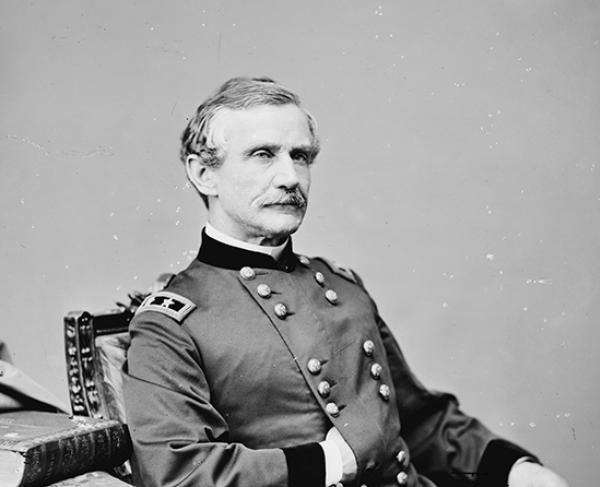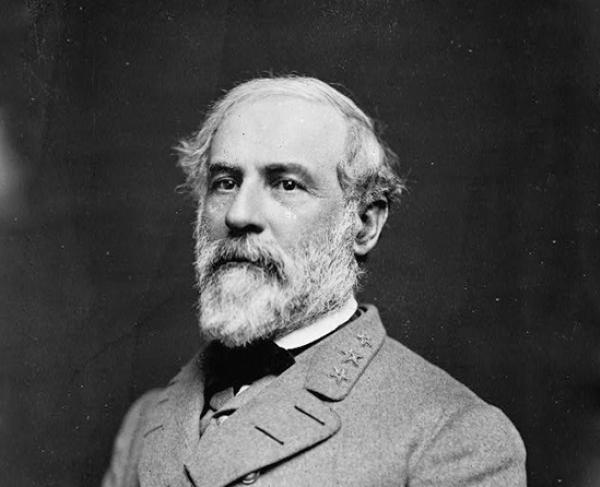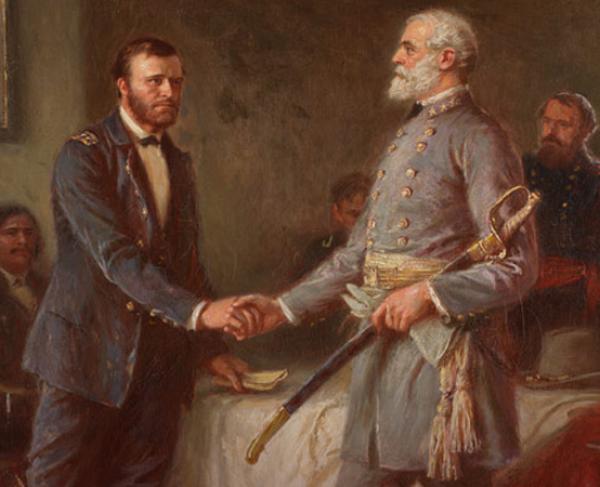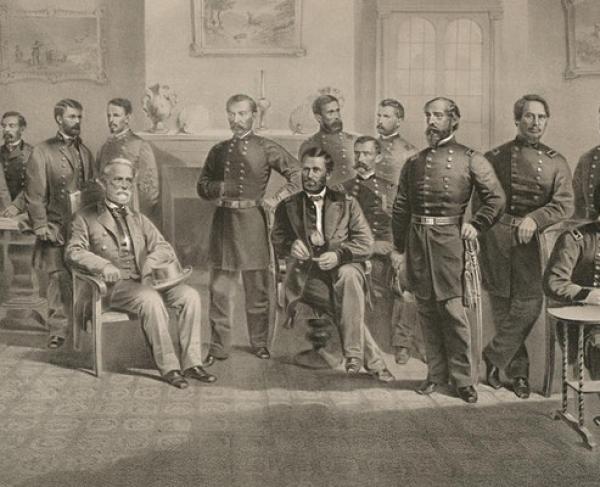Farmville, VA | Apr 7, 1865
Retreating from Richmond and Petersburg, Virginia, the Army of Northern Virginia skirmished with Union forces at the Battle of Cumberland Church on their way to Appomattox Court House, where Robert E. Lee surrendered to Ulysses S. Grant on April 9th.
How It Ended
Confederate Victory. While Confederate forces were able to hold off Union Major General Andrew A. Humphreys' attacks at the fortified high ground of Cumberland Church, Confederate forces retreated from the area, worried that Union forces could close in on their position. The Army of Northern Virginia began a march at 11 pm that night toward Appomattox Court House, where they would be intercepted by Union forces on April 9th, ending in Lee’s surrender to General Ulysses S. Grant.
In Context
After months of a siege on Petersburg and Richmond, Virginia, the Confederate government and forces abandoned both cities. The Army of Northern Virginia retreated west with the hope of eventually heading south to reconvene with Confederate troops in North Carolina under Joseph E. Johnston. Union and Confederate forces skirmished several times during the retreat, and Lee lost nearly one-fourth of his army at the Battle of Sailor’s Creek on April 6, 1865. Among the prisoners were six Confederate generals, including Richard S. Ewell, Joseph Kershaw, and Custis Lee, Robert E. Lee’s son. After the battle, Lee wrote to Confederate President Jefferson Davis, "a few more Sailor's Creeks and it will all be over."
Heading west along the Appomattox River, Confederate forces arrived in Cumberland County on April 6, 1865, intending to cross High Bridge and collect supplies located at Farmville, Virginia. During the Battle of High Bridge on April 6th, Confederate forces successfully crossed the river and arrived at Farmville but were unable to destroy the bridge and stop the Union’s pursuit. Four miles west and three miles north of Farmville, Confederate forces fortified a position at Cumberland Church.
At 1:00 pm, Major General Andrew A. Humphreys, with brigadier generals Nelson Miles and Regis de Trobriand’s divisions, arrived near the Lynchburg stage road at Cumberland Church and attacked the Confederate forces there. Confederate forces began to build breastwork on the high ground, and Union forces were unable to make a successful assault. Unable to take the position, Humphreys messaged the Army of the Potomac commander Major General George Meade for reinforcements. However, unbeknownst to Humphreys and Meade, the bridge at Farmville had been destroyed, and reinforcements would not be able to reach Cumberland Church. Without reinforcements and night approaching, Humphreys ceased attacks for the night.
Meanwhile, Grant wrote to Lee at 5:00 pm asking for the Army of Northern Virginia’s surrender:
General:
The results of the last week must convince you of the hopelessness of further resistance on the part of the Army of Northern Virginia in this struggle. I feel that it is so, and regard it as my duty to shift from myself the responsibility of any further effusion of blood, by asking of you the surrender of that portion of the C.S. Army known as the Army of Northern Virginia.
Arriving at 8:30 pm, Lieutenant General James Longstreet, after seeing the message, reportedly said: “Not yet.” Lee responded that he disagreed with Grant about the “hopelessness” of the situation but asked for Grant’s terms of surrender.
645
255
While Confederate forces retained the high ground at Cumberland Church, the Army of Northern Virginia worried that they could be surrounded by Union forces the next day and retreated on a night march west at 11 pm. Delays on this march allowed Union forces to cut the retreating army off at Appomattox Station, where the two sides skirmished. On April 9th, Robert E. Lee surrendered to Ulysses S. Grant at Appomattox Court House.
By the night of April 7th, the Army of Northern Virginia had successfully defended Cumberland Church from Union assaults. Marching west along the Appomattox River, Robert E. Lee was heading toward the South Side Railroad at Appomattox Station, where food supplies awaited the troops. If Confederate forces could reach these supplies, they would have a chance of being properly outfitted to turn south and reconvene with General Joseph Johnston’s army in North Carolina. However, because of the delay at the Battle of Cumberland Church, Union forces intercepted the Confederate retreat and defeated them at the Battle of Appomattox Station on April 8th. With this defeat, Lee lost all hope of locating supplies in the area to outfit his army, which led to his surrender to Grant on April 9th at Appomattox Court House.
Cumberland Church: Featured Resources
All battles of the Appomattox Campaign
Related Battles
12,000
12,000
645
255






